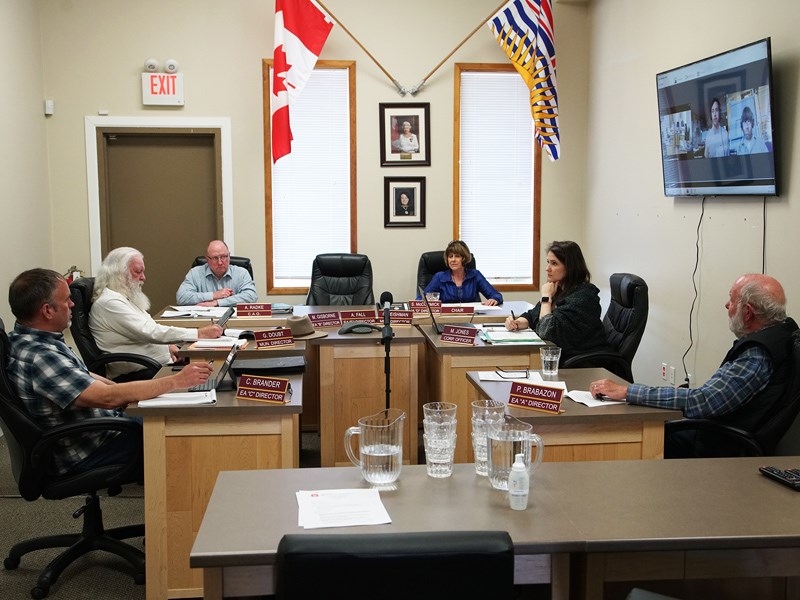qathet Regional District’s (qRD) committee of the whole is recommending the regional board adopts a code of conduct as prepared by a working group of directors.
At the April 15 meeting, regional district chair Patrick Brabazon said the code of conduct had been a long time coming.
“Let’s get it done,” he said.
Electoral Area E director Andrew Fall said he would like to thank staff and other members of the working group for putting together the code of conduct. He said city director George Doubt put in a lot of work and there were merits of having a short code of conduct, as has been developed for qRD.
“We reviewed and looked at a number of other codes of conduct and a lot of them are very good, but very long,” said Fall. “Rather than having something comprehensive, having something short that can be placed on the wall and read quickly was the intent.”
Doubt said he wanted to thank manager of administrative services Michelle Jones for providing links to the Local Government Management Association of BC document they sent out this month, which, coincidentally, had an article on codes of conduct for municipalities and regional districts.
“I read through it and we hit most of the high points,” said Doubt. “We certainly considered all of the things being discussed in that article. There are a number of things the working group chose not to include in this code of conduct.”
These included topics such as conflict of interest, how decisions of the board would be reported to the public and how social media would be dealt with. Doubt said the working group decided to stay away from dealing with those issues and keep it focused on behaviour of directors, staff and the public at meetings.
“There’s a number of things we should be thinking about as we go forward, and possibly review this document over a period of time,” Doubt said. “One thing is whether we should mention the code of conduct in the oath of office that members swear when they are elected. That’s something we might want to discuss before the next election.”
How to investigate and remedy breaches of the code is not included in the code of conduct but Doubt thinks the investigation and remedy options in the local government charter and Local Government Act can help with those things.
“This document reflects the attitude of the community,” said Doubt. “We’ve gone through a number of codes of conduct from different organizations, both locally and across the country. I hope to get the support of the group.”
Committee chair Sandy McCormick said she thought the code of conduct was timely and sets ground rules for everybody.
“It’s a very good thing,” said McCormick. “Thank you to the working group.”
Electoral Area B director Mark Gisborne said he had issues with the code of conduct as presented. He said his understanding was it was to promote responsible conduct.
Gisborne said it should not become a weaponized tool to promote hostility and division among the membership. He said a code of conduct should be something constructive, where if people stray from the goal, it should be the guide to bring them back on course.
“A code of conduct doesn’t need to go into every detail but it does need to provide a clear path,” said Gisborne. “It needs to apply to all elected officials, staff and members of the public who come in.”
Gisborne said the code of conduct should ensure standards of conduct are clear and easy to interpret.
“Any member should be able to see whether they are or are not meeting the standard,” said Gisborne. “If any part of this is vague and it’s unclear, you might run into some problems.
“How do we determine if our code of conduct is working? It is supposed to be a living document. Some organizations will even have a quick meeting at the end of their meetings to discuss how the code of conduct was followed in the previous meeting.”
Gisborne asked if someone is not following the code of conduct, “what do we do?”
“The code of conduct should outline steps to bring members back on track,” said Gisborne. “Resorting to a resolution of censure should be seen as a last step when all other avenues have been exhausted and failed. Perhaps it is a matter of misunderstanding or communication that needs to be addressed.”
Guidelines of the code of conduct should also set out how to deal with issues and what is the timeline, added Gisborne.
McCormick asked if the code of conduct applied to elected officials, staff and public in attendance at meetings.
Doubt said the scope applies to all meetings and assemblies qRD holds and to any person attending.
“Basically, the code of conduct applies to everybody,” said Doubt. “This document is made, in a concise and short way, to lay out the expectations that people will have for reasonable, professional and respectful contact at a meeting. Much of the wording is taken from other codes of conduct across the country and local organizations.”
Gisborne said he would not be endorsing the code of conduct.
“I would like to see it get a bit more volume and a bit more sophistication and for it to come back for more input from all members,” said Gisborne. “Maybe we can make it a little more robust for everyone.”
The committee voted to send the matter to the regional board with Gisborne opposed.



